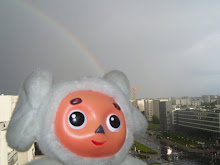So, I returned to the Kino Luna (I bypassed the concessions, being a little late into the theater.)
Mala Moskwa is a story told between two time frames, one set in the present day and the other set in 1967-68. It doesn't take place in Moscow (but is mostly in Russian), but rather in Legnica, a city on the western border of Poland. The main actress, Svetlana Khodchenkova, hammily plays the main character, named Vera, in the 1960's timeframe, and Vera's daughter, Vera, in the modern timeframe.
The seemingly happy couple of Khodchenkova and her pilot husband, Juri (Dmitri Ulyanov), arrive in to a Soviet military base in Western Poland after her husband has been dropped from being a cosmonaut. They share their living space with a Catholic Armenian couple expecting a baby.
The strikingly beautiful Khodchenkova catches the eye of a dashing Polish military officer, Michal "Misha" Janicki (Leslaw Zurek), who also happens to be somewhat of an musician, when she sings a Polish song (in Polish) at a music competition, winning the first prize. From then on Zurek and Khodchenkova start a torrid and forbidden love affair that ends with her suicide.
The sub-plot consists of Juri and his now-grown daughter (played by Khodchenkova again. All they did was lazily update her fashion; she even keeps her beauty mark next to her mouth) returning to Legnica, searching for some answers as Juri tells his daughter about her mother, whom she hates.
About ten minutes into the film I began to realize that the whoever made the movie (writer, director) was less concerned with telling the story than making a fiercely nationalistic movie, where the virtues of Poland: it's culture and it's people, were extolled in contrast to the brutish Russians. The younger Vera is introduced slandering the Poles and Poland while admonishing her father for defending them and taunting him constantly about her mother's affair. All the Russian officers are portrayed in an unsympathetic light, pouring on vitriol about Poland; all things Polish display their obvious primacy, even in the face of the assault by the Soviets.
The premise slips slowly away from a tragic tale of forbidden love to one where none of the characters are remotely sympathetic, likable, or even tragic. Zurek's character is about as suave as Larry The Cable Guy; it's a wonder he could woo a beauty such as Khodchenkova when in reality he wouldn't be able to seduce a fat chick who hasn't been laid in twenty years. His courtship of her consists of pathetic pick up lines and sexual advances, which she weakly resists. Their romance is hardly a secret, as everyone (including her husband) on and off the military base knows about it. Her husband barely even objects, but simply glumly looks on as his wife gets stolen away. In fact, most of the people involved in the love story end up looking repugnant and Vera's death is a bit of some twisted justice.
Juri's commanders begin to take notice and object, and the whole thing finally comes to a head, but not before the overwhelming goodness of the Poles (plus a polonized German) and the beauty of Poland is shown in contrast to the wicked Russians and their awful air base. There are some small sub-plots about the illegal baptism of the Armenians' baby, the backdrop of the invasion of Czechoslovakia, and, of course, the daughter's constant harping on her hapless father. Between the Polish proverbs and the overwrought insults, there's a film with a lot of growing up to do. Sadly, it's the characters that doom this picture.
The whole shitty movie fucks the viewer one last time in the last scene (spoiler: it takes place at Vera's grave) in the final confrontation between the weak Russian and the righteous Pole.






No comments:
Post a Comment